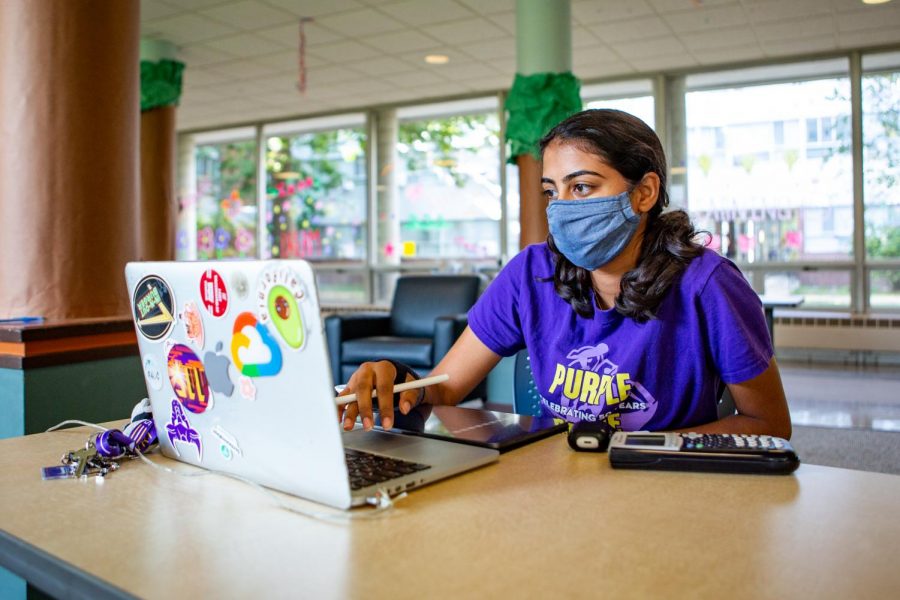Living-learning communities offer students social enrichment, opportunity for involvement
Anusha Adira, Freshman in Engineering, studies in the lobby of Weston which is home to the LEADS Living-learning community on Sept. 18. LLCs offer students an opportunity to get involved and increase their social interactions.
Sep 22, 2021
Outside of enrolling in RSOs or choosing to rush pre-professional or social Greek life, many students also select an opportunity much closer – one that lies within their living quarters.
The University offers 11 distinct living-learning communities situated on specific floors in residence halls that specialize in certain areas and provide resources. These include but are not limited to the Business LLC, LEADS LLC, Honors LLC and Sustainability LLC.
According to Isabella Palm, sophomore in Engineering and Honors Ambassador for the Honors LLC, living-learning communities provide a crucial environment for like-minded individuals with shared interests and passions.
“It’s just a great community where you’re able to essentially live with people who are also going through similar courses like you,” Palm said. “Typically, you have similar interests as you’re all honors kids. So you’re gonna share experiences in maybe STEM related fields or business – there’s a wide range of majors.”
Palm decided to join the Honors LLC her freshman year because she felt that it would otherwise be more difficult to find students similar to her that valued academics equally as much as social interactions and pursuits.
Get The Daily Illini in your inbox!
“I noticed that for a top school for a lot of things, obviously, you’re gonna have people who are really passionate about what they do, but being part of the honors community made it a lot easier at least to find people living right next to you who are really into architecture, or design, or engineering or different things like that,” Palm said. “It’s really nice to see other people who genuinely like the stuff that they are working on but also still have a good social side to them.”
Like Palm, Aarushi Raizada, freshman in Business and the Business LLC, similarly joined a living-learning community in order to meet individuals who shared similar interests.
“I really wanted a smaller community that not only shared my interests but could make the University feel that much smaller and less intimidating,” Raizada said. “I didn’t really have a lot of connections at the school, so I was definitely looking for something that not only would give me extra opportunities to grow and expand on the professional side but would also help me to make closer knit friend groups with people who shared my interests.”
Because LLCs center around a specialized program, they seek to introduce and offer a plethora of events that only members can take advantage of.
For the Honors LLC, these range from professional to social events, according to Palm. Some professional events include inviting companies to host talks, professional headshots and conversations by invited staff members. Other social events, which Palm hopes to have one or two times a month, include trivia nights and haunted mansions.
Unlike Palm, Raizada is discontent with the lack of events offered by the Business LLC considering students in living-learning communities must pay a specific fee to reside in the area and participate in the program, which frequently comes at the cost of $300.
“As far as the activities go, I do wish that I got a bit more,” Raizada said. “I wish that they had had more events, or we got more things. I wish that they had done a little bit more on their end.”
However, Raizada believes that the social enrichment with like-minded and intellectual peers the Business LLC balanced her concerns over the lack of events.
“If I wanted to go out and join a club, I could reach out to my neighbor or I could ask my friend who lives down the hall if they want to do it with me,” Raizada said. “(The) kids in the Business LLC are so open minded about this stuff that I really love the people and how open everybody is here to forming connections.”
Palm echoed similar sentiments regarding the beneficial social atmosphere.
“You always see people in study groups hanging out in the dorms working, and even when they’re not, they’re just hanging out and having fun playing games or whatever inside their dorms,” Palm said. “It definitely is like a good mix of academics and a normal college life.”
In order to join a living-learning community, interested students must apply by writing a brief essay explaining how they can benefit from the program and what they can offer, according to Palm.
While Raizada hopes to live in an apartment next year, she believes that living-learning communities are great ways for freshman to become acclimated to the University.
“I’m not really sure how much I’m going to want to live in the dorms next year, but I would definitely recommend it as an experience for freshmen,” Raizada said.






